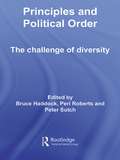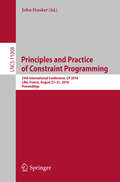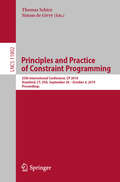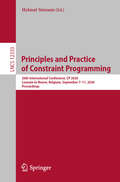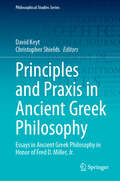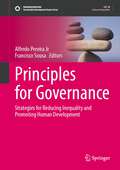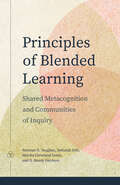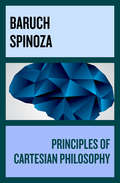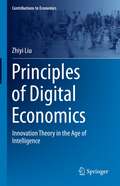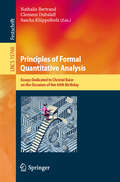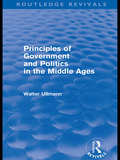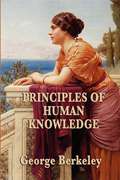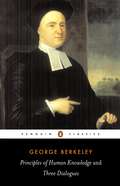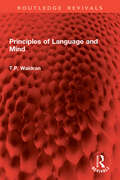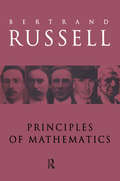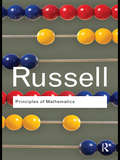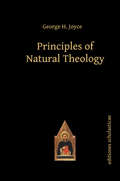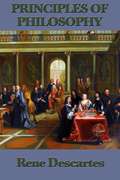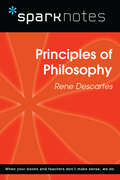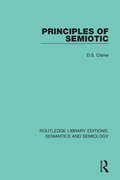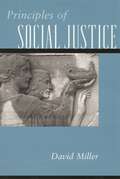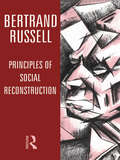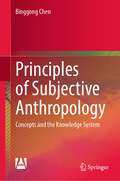- Table View
- List View
Principles and Political Order: The Challenge of Diversity (Routledge Innovations in Political Theory #Vol. 20)
by Bruce Haddock Peri Roberts Peter SutchAn ideal new multi-disciplinary volume for students and scholars of philosophy, contemporary political theory, and international relations. This volume offers key insights into the work of the chief figures in the contemporary debate surrounding thin universalism and presents a usefully themed contribution to the secondary literature on the work of Onora O’Neill, John Rawls, Michael Walzer, Martha Nussbaum, Stuart Hampshire and others as well as a commentary on contemporary debates surrounding human rights and distributive justice. This new book enables the reader to strongly grasp all the core debates in contemporary normative theory.
Principles and Practice of Constraint Programming: 24th International Conference, Cp 2018, Lille, France, August 27-31, 2018, Proceedings (Lecture Notes in Computer Science #11008)
by John HookerThis book constitutes the proceedings of the 24th International Conference on Principles and Practice of Constraint Programming, CP 2018, held in Lille, France, in August 2018.The 41 full and 9 short papers presented in this volume were carefully reviewed and selected from 114 submissions. They deal with all aspects of computing with constraints including theory, algorithms, environments, languages, models, systems, and applications such as decision making, resource allocation, scheduling, configuration, and planning. The papers were organized according to the following topics/tracks: main technical track; applications track; CP and data science; CP and music; CP and operations research; CP, optimization and power system management; multiagent and parallel CP; and testing and verification.
Principles and Practice of Constraint Programming: 25th International Conference, CP 2019, Stamford, CT, USA, September 30 – October 4, 2019, Proceedings (Lecture Notes in Computer Science #11802)
by Thomas Schiex Simon De GivryThis book constitutes the proceedings of the 25th International Conference on Principles and Practice of Constraint Programming, CP 2019, held in Stamford, CT, USA, France, in September/October 2019.The 44 full papers presented in this volume were carefully reviewed and selected from 118 submissions. They deal with all aspects of computing with constraints including theory, algorithms, environments, languages, models, systems, and applications such as decision making, resource allocation, scheduling, configuration, and planning. The papers were organized according to the following topics/tracks: technical track; application track; multi-agent and parallel CP track; testing and verification track; CP and data science track; computational sustainability; and CP and life sciences track.
Principles and Practice of Constraint Programming: 26th International Conference, CP 2020, Louvain-la-Neuve, Belgium, September 7–11, 2020, Proceedings (Lecture Notes in Computer Science #12333)
by Helmut SimonisThis book constitutes the proceedings of the 26th International Conference on Principles and Practice of Constraint Programming, CP 2020, held in Louvain-la-Neuve, Belgium, in September 2020. The conference was held virtually due to the COVID-19 pandemic. The 55 full papers presented in this volume were carefully reviewed and selected from 122 submissions. They deal with all aspects of computing with constraints including theory, algorithms, environments, languages, models, systems, and applications such as decision making, resource allocation, scheduling, configuration, and planning. The papers were organized according to the following topics/tracks: technical track; application track; and CP and data science and machine learning.
Principles and Praxis in Ancient Greek Philosophy: Essays in Ancient Greek Philosophy in Honor of Fred D. Miller, Jr. (Philosophical Studies Series #155)
by Christopher Shields David KeytThis collection of original articles draws from a cross section of distinguished scholars of ancient Greek philosophy. It is focussed primarily on the philosophy of Aristotle but comprises as well studies of the philosophy of Socrates, Plato, and Epicurus. Its authors explore a range of complementary topics in value theory, moral psychology, metaphysics, natural philosophy, political theory, and methodology, highlighting the rich and lasting philosophical contributions of the thinkers investigated. Opening with an engaging intellectual autobiography of its honoree, Fred D. Miller, Jr., the volume offers treatments of Socrates as a citizen; Plato’s attitude towards poetry; Socratic self-knowledge; Plato’s conception of law in his Republic; explorations of reason, goodness, and moral conduct in Plato; Platonic metaphysics; Aristotelian causation; Aristotelian metaphysics and normativity; natural philosophy in Aristotle; Aristotelian logic; political theory and approaches to justice in Aristotle’s Politics; methodological reflections on how best to approach Aristotle’s indefensible ideas; and closes with a reconsideration of Epicurus on death and the art of dying. Altogether, the volume reflects the richness of the ongoing community of philosophical scholars dedicated to reconstructing, assessing, and criticizing the principal philosophers of the ancient world, whose epoch-forming explorations of the key elements of human life—considered socially, politically, psychologically, and metaphysically—remain topics of lively investigation today. It will be of interest to philosophers of many stripes, including those with a primary interest in ancient philosophy but extending as well to those with systematic interests in the themes it explores. This volume will be a valuable addition to all libraries serving communities dedicated to researching and studying the origins of Western philosophy.
Principles for Governance: Strategies for Reducing Inequality and Promoting Human Development (Sustainable Development Goals Series)
by Alfredo Pereira Francisco SousaThis edited volume provides strategies for reducing inequality and promoting human development through the use of innovative digital technology and the adoption of new bioethical principles for governance. The book is structured around a series of practical proposals which can be adapted to different circumstances, countries, and political systems. Written by an interdisciplinary panel of international researchers and professionals, each chapter details a proposal for a policy—new social technology, Green Deals, robust social assistance—that will move society forward towards a sustainable, digital, and equitable future. Researchers across multiple disciplines--public administration, cognitive technology, E-learning, finance, philosophy of economy, agronomics, forest engineering, bioethics and education—will find this volume a useful reference.
Principles of Blended Learning: Shared Metacognition and Communities of Inquiry (Issues in Distance Education)
by D. Randy Garrison Norman D. Vaughan Martha Cleveland-Innes Deborah DellThe rapid migration to remote instruction during the Covid-19 pandemic has expedited the need for more research, expertise, and practical guidelines for online and blended learning. A theoretical grounding of approaches and practices is imperative to support blended learning and sustain change across multiple levels in education organizations, from leadership to classroom. The Community of Inquiry is a valuable framework that regards higher education as both a collaborative and individually constructivist learning experience. The framework considers the interdependent elements of social, cognitive, and teaching presence to create a meaningful learning experience. In this volume, the authors further explore and refine the blended learning principles presented in their first book, Teaching in Blended Learning Environments: Creating and Sustaining Communities of Inquiry, with an added focus on designing, facilitating, and directing collaborative blended learning environments by emphasizing the concept of shared metacognition.
Principles of Cartesian Philosophy: With Metaphysical Thoughts And Lodewijk Meyer's Inaugural Dissertation
by Baruch SpinozaThis book provides depth and insight into the philosophical doctrine of Rene Descartes, and compares it to the metaphysics of Spinoza himself.
Principles of Cartesian Philosophy: With Metaphysical Thoughts And Lodewijk Meyer's Inaugural Dissertation
by Baruch SpinozaThis book provides depth and insight into the philosophical doctrine of Rene Descartes, and compares it to the metaphysics of Spinoza himself.
Principles of Digital Economics: Innovation Theory in the Age of Intelligence (Contributions to Economics)
by Zhiyi LiuThis book aims to "digital economics" as an inter-discipline research area, by integrating economics, philosophy of technology, computer science and sociology. It takes an in-depth look at the history of technology development covering the changes and challenges to the society and thoughts, as it is, which helps readers to understand the logic and operation of the emerging integrated economy. Also a lot of innovation cases in digital transformation of China are presented in this book.
Principles of Formal Quantitative Analysis: Essays Dedicated to Christel Baier on the Occasion of Her 60th Birthday (Lecture Notes in Computer Science #15760)
by Nathalie Bertrand Clemens Dubslaff Sascha KlüppelholzThis Festschrift is dedicated to Christel Baier in recognition of her contributions to the field of theoretical computer science, particularly in formal methods, temporal logics, model checking, and probabilistic systems. After earning her doctorate from the University of Mannheim, Christel Baier held research and professorial positions in Mannheim and Bonn. Since 2006 she has been a full professor of Algebraic and Logical Foundations of Computer Science at Technische Universität Dresden, where she currently serves as the Dean of the Faculty of Computer Science. In 2011, she was elected to the Academia Europaea. She was the Editor-in-Chief of Acta Informatica from 2015 to 2022, and received an honorary doctorate from RWTH Aachen University in 2022. Among her many notable research achievements, Christel Baier has shaped the foundations and practical applications of system verification. She pioneered probabilistic model checking, advanced techniques for model checking of continuous-time Markov chains, and coauthored the standard textbook Principles of Model Checking. Beyond her research contributions, she is widely respected within the scientific community. Her service has included invited talks, membership in key steering and program committees, and organizing scientific events. Christel Baier has mentored and guided many students and fellow scientists. They appreciate her way of approaching every task with remarkable persistence, focus, and diligence. Many of these collaborators were pleased to contribute to this volume and to celebrate joint work and successes.
Principles of Government and Politics in the Middle Ages (Routledge Revivals: Walter Ullmann on Medieval Political Theory)
by Walter UllmannIn many respects this book, first published in 1961, marked a somewhat radical departure from contemporary historical writings. It is neither a constitutional nor a political history, but a historical definition and explanation of the main features which characterised the three kinds of government which can be discerned in the Middle Ages – government by the Pope, the King, the People. The author’s enviable knowledge of the sources – clerical, secular, legal, constitutional, liturgical, literary – as well as of modern literature enables him to demonstrate the principles upon which the papal government, the royal government, and the government of the people rested. He shows how the traditional theocratic forms of government came to be supplanted by forms of government based on the will of the people. Although concerned with the Middle Ages, the book also contains much that is of topical interest to the discerning student of modern institutions. Medieval history is made understandable to modern man by modern methods.
Principles of Human Knowledge
by George BerkeleyThrough reflection or introspection, is it possible to attempt to know if a sound, shape, movement, or color can exist unperceived by a mind? This book largely seeks to refute the claims made by Berkeley's contemporary John Locke about the nature of human perception. Both Locke and Berkeley agreed that there was an outside world, and it was this world which caused the ideas one has within one's mind. Berkeley sought to prove that the outside world was also composed solely of ideas.
Principles of Human Knowledge and Three Dialogues
by George BerkeleyOne of the greatest British philosophers, Bishop Berkeley (1685-1753) was the founder of the influential doctrine of Immaterialism - the belief that there is no reality outside the mind, and that the existence of material objects depends upon their being perceived. The Principles of Human Knowledge eloquently outlines this philosophical concept, and argues forcefully that the world consists purely of finite minds and ideas, and of an infinite spirit, God. A denial of all non-spiritual reality, Berkeley's theory was at first heavily criticized by his contemporaries, who feared its ideas would lead to scepticism and atheism. The Three Dialogues provide a powerful response to these fears.
Principles of Language and Mind (Routledge Revivals)
by T.P. WaldronFirst published in 1985, Principles of Language and Mind presents a systematic and original account of the principles which enable us to understand the origin, primary functions, and later development of human language. It also clarifies the way in which this development underpins another: that of the distinctively human form of intelligence which we call mind.The progressive complications of both language and conceptual thought—from common speech and everyday thinking to the higher forms of theoretical discourse and understanding—are shown to have a perfectly clear explanation, made possible by new application of evolutionary principles in fields that have traditionally resisted such an approach. The author examines a complex of problems variously referred to as linguistic, psychological, logical, and epistemological, along with others concerning myth, metaphysics, causality, and mathematics. He shows that these problems are so interrelated that they can be solved only in the context of a naturalistic—that is, evolutionary—conception of human psychology. He demonstrates that this in turn is possible only on the basis of a systematic theory of language. The theory presented fills serious gaps in modern evolutionary thinking and also in the study of humanities. A theory of evolution which cannot explain the emergence of the mind that conceived it, and theories of mind which sever human intelligence from its biological roots, are equally useless for an understanding of human nature and human problems.
Principles of Mathematics
by Bertrand RussellPublished in 1903, this book was the first comprehensive treatise on the logical foundations of mathematics written in English. It sets forth, as far as possible without mathematical and logical symbolism, the grounds in favour of the view that mathematics and logic are identical. It proposes simply that what is commonly called mathematics are merely later deductions from logical premises. It provided the thesis for which Principia Mathematica provided the detailed proof, and introduced the work of Frege to a wider audience.In addition to the new introduction by John Slater, this edition contains Russell's introduction to the 1937 edition in which he defends his position against his formalist and intuitionist critics.
Principles of Mathematics (Routledge Classics)
by Bertrand RussellFirst published in 1903, Principles of Mathematics was Bertrand Russell’s first major work in print. It was this title which saw him begin his ascent towards eminence. In this groundbreaking and important work, Bertrand Russell argues that mathematics and logic are, in fact, identical and what is commonly called mathematics is simply later deductions from logical premises. Highly influential and engaging, this important work led to Russell’s dominance of analytical logic on western philosophy in the twentieth century.
Principles of Natural Theology
by George JoyceNatural theology is that branch of philosophy that investigates what human reason, unaided by revelation, can tell us concerning God. The end at which it aims is to demonstrate the existence of God, to establish the principal divine attributes, to vindicate God's relation to the world as that of the Creator to the creature, and, finally, to throw what light it can on the action of divine providence in regard to man and on the problem of evil.
Principles of Philosophy
by Rene DescartesJack London (January 12, 1876 - November 22, 1916), was an American author who wrote The Call of the Wild and other books. A pioneer in the then-burgeoning world of commercial magazine fiction, he was one of the first Americans to make a huge financial success from writing.The Scarlet Plague was written by Jack London and originally published in London Magazine in 1912. It was re-released in February of 2007 by Echo Library. The story takes place in 2072, sixty years after the scarlet plague has depopulated the planet. James Howard Smith is one of the few people left alive in the San Francisco area, and as he realizes his time grows short, he tries to impart the value of knowledge and wisdom to his grandsons.American society at the time of the plague has become severely stratified and there is a large hereditary underclass of servants and "nurses;" and the politcal system has been replaced by a formalized oligarchy. Commercial airship lines exist, as do some airships privately owned by the very rich.
Principles of Philosophy (SparkNotes Philosophy Guide)
by SparkNotesPrinciples of Philosophy (SparkNotes Philosophy Guide) Making the reading experience fun! SparkNotes Philosophy Guides are one-stop guides to the great works of philosophy–masterpieces that stand at the foundations of Western thought. Inside each Philosophy Guide you&’ll find insightful overviews of great philosophical works of the Western world.
Principles of Semiotic (Routledge Library Editions: Semantics and Semiology)
by David S. ClarkeFirst published in 1987, this book is an attempt to re-establish semiotic on the basis of principles consistent with its past history, rather than the ‘cultural semiotics’ of the European tradition, and especially with the guiding ideas of Peirce and Morris. The book is divided into two parts, with the first two chapters providing the background for the more systematic discussions of signs at different levels taken up in the last three. In the final chapter issues that have become the focus of recent philosophy of language regarding the reference, meaning, and truth of sentences are discussed in light of the analogies to more primitive signs developed in the preceding two chapters.
Principles of Social Justice
by David MillerDeveloping a new theory for social justice, David Miller, in this book, argues that principles of justice must be understood contextually, with each principle finding its natural home in a different form of human association.
Principles of Social Justice
by David MillerSocial justice has been the animating ideal of democratic governments throughout the twentieth century. Even those who oppose it recognize its potency. Yet the meaning of social justice remains obscure, and existing theories put forward by political philosophers to explain it have failed to capture the way people in general think about issues of social justice. This book develops a new theory. David Miller argues that principles of justice must be understood contextually, with each principle finding its natural home in a different form of human association. Because modern societies are complex, the theory of justice must be complex, too. The three primary components in Miller's scheme are the principles of desert, need, and equality. The book uses empirical research to demonstrate the central role played by these principles in popular conceptions of justice. It then offers a close analysis of each concept, defending principles of desert and need against a range of critical attacks, and exploring instances when justice requires equal distribution and when it does not. Finally, it argues that social justice understood in this way remains a viable political ideal even in a world characterized by economic globalization and political multiculturalism. Accessibly written, and drawing upon the resources of both political philosophy and the social sciences, this book will appeal to readers with interest in public policy as well as to students of politics, philosophy, and sociology.
Principles of Social Reconstruction
by Bertrand RussellThis book, originally entitled Why Men Fight, is generally seen as the fullest expression of Russell's political philosophy. Russell argues that after the experience of the Great War the individualistic approach of traditional liberalism has reached its limits. Political theory must be based on the motivated forces of creativity and impulse rather than on competition. Both are best fostered in the family, in education, and in religion - each of which Russell proceeds to discuss. The ideas expressed in Principles of Social Reconstruction have greatly contributed to Russell's fame as a social critic and anti-war activist. The new introduction by Richard Rempel locates them in the context of Russell's other writings and show that neither his ideas nor his language have lost their force and topicality over the years.
Principles of Subjective Anthropology: Concepts and the Knowledge System
by Binggong ChenThis book puts forward the concept of “subjective anthropology” and outlines a theoretical system that will allow subjective anthropology to qualify as a new academic discipline in its own right. In an effort to respond to the field’s proper role as the science of humanity, subjective analysis has been introduced into the study of anthropology. The book fills two distinct gaps in our knowledge and understanding of modern man, offering detailed descriptions of personality and of groups, while also advancing the theory of “structure and choice.” The book formulates seven basic principles of subjective anthropology and divides anthropology into three major branches: subjective anthropology, cultural anthropology, and biological (or physical) anthropology, which can be further divided into sub-branches. The book pursues three key goals: advancing and developing the theoretical system of subjective anthropology, reconstructing the discipline of anthropology, and establishing a Chinese anthropology with Chinese characteristics, Chinese visions, and Chinese styles.
